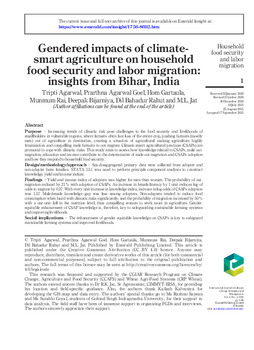| Creator:
| Agarwal, T. |
| Creator:
| Goel, P. A. |
| Creator:
| Gartaula, H. |
| Creator:
| Rai, M. |
| Creator:
| Bijarniya, D. |
| Creator:
| Rahut, D.B. |
| Creator:
| Jat, M.L. |
| Year:
| 2022 |
| URI:
| https://hdl.handle.net/10883/21946 |
| Language:
| English |
| Publisher:
| Emerald Group Publishing Limited |
| Copyright:
| CIMMYT manages Intellectual Assets as International Public Goods. The user is free to download, print, store and share this work. In case you want to translate or create any other derivative work and share or distribute such translation/derivative work, please contact CIMMYT-Knowledge-Center@cgiar.org indicating the work you want to use and the kind of use you intend; CIMMYT will contact you with the suitable license for that purpose |
| Type:
| Article |
| Country focus:
| India |
| Place of Publication:
| United Kindom |
| Volume:
| 14 no. 1 p. 1-19 |
| DOI:
| 10.1108/IJCCSM-01-2020-0004 |
| Keywords:
| Food and Nutrition Security |
| Keywords:
| Knowledge Index |
| Description:
| Purpose – Increasing trends of climatic risk pose challenges to the food security and livelihoods of smallholders in vulnerable regions, where farmers often face loss of the entire crop, pushing farmers (mostly men) out of agriculture in destitution, creating a situation of agricultural making agriculture highly feminization and compelling male farmers to out-migrate. Climate-smart agricultural practices (CSAPs) are promoted to cope with climatic risks. This study aims to assess how knowledge related to CSAPs, male outmigration, education and income contribute to the determinants of male out-migration and CSAPs adoption and how they respond to household food security. Design/methodology/approach – Sex-disaggregated primary data were collected from adopter and non-adopter farm families. STATA 13.1 was used to perform principle component analysis to construct knowledge, yield and income indices. Findings – Yield and income index of adopters was higher for men than women. The probability of outmigration reduced by 21% with adoption of CSAPs. An increase in female literacy by 1 unit reduces log of odds to migrate by 0.37. With every unit increase in knowledge index, increase in log-odds of CSAPs adoption was 1.57. Male:female knowledge gap was less among adopters. Non-adopters tended to reduce food consumption when faced with climatic risks significantly, and the probability of migration increased by 50% with a one-unit fall in the nutrition level, thus compelling women to work more in agriculture. Genderequitable enhancement of CSAP knowledge is, therefore, key to safeguarding sustainable farming systems and improving livelihoods. Social implications – The enhancement of gender equitable knowledge on CSAPs is key to safeguard sustainable farming systems and improved livelihoods. |
| Agrovoc:
| MIGRATION |
| Agrovoc:
| CLIMATE-SMART AGRICULTURE |
| Agrovoc:
| FOOD SECURITY |
| Agrovoc:
| NUTRITION SECURITY |
| ISSN:
| 1756-8692 |
| Journal:
| International Journal of Climate Change Strategies and Management |

